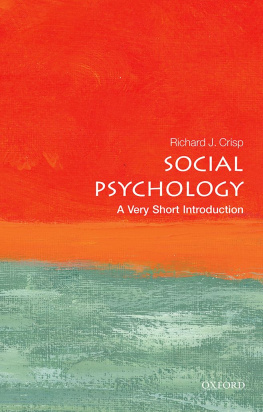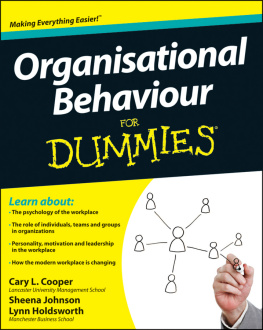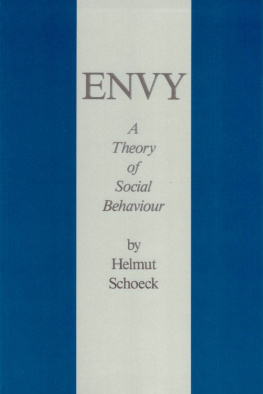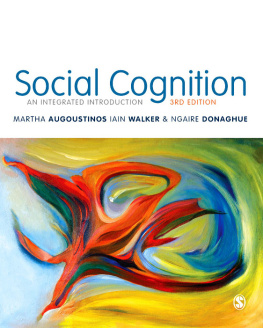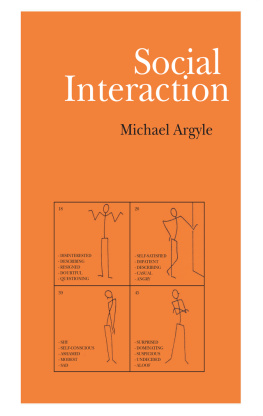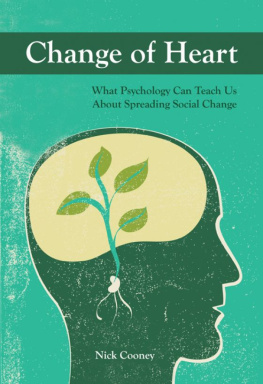PENGUIN BOOKS
THE PSYCHOLOGY OF INTERPERSONAL BEHAVIOUR
Michael Argyle, D.Sc., D.Litt., Hon. D.Sc. Psych., is Emeritus Reader in Social Psychology, Emeritus Fellow of Wolfson College, and Emeritus Professor of Psychology of Oxford Brookes University. He was born in 1925, went to Nottingham High School and Emmanuel College, Cambridge, and was a navigator in the RAF. He has been teaching social psychology at Oxford since 1952. He has been engaged in research in various aspects of social psychology and is particularly interested in the experimental study of social interaction and its application to wider social problems. He has been a visiting professor at a number of universities in the USA, Canada and Australia, and has lectured in thirty-four countries. He established the Oxford Social Psychology group, which produced seventy D. Phils, some of them now professors elsewhere.
His recent books have been Psychology and Social Class, The Social Psychology of Everyday Life, The Psychology of Happiness, The Anatomy of Relationships (with Monika Henderson) and new editions of Bodily Communication and The Social Psychology of Work. He has written numerous articles in British, American and European journals. He helped to found the British Journal of Social and Clinical Psychology and was Social Psychology editor (19617). He was editor of the Pergamon Press International Studies in Experimental Social Psychology and Chairman of the Social Psychology Section of the British Psychological Society (19647 and 19724).
He is married and has four children; his hobbies are travel, interpersonal behaviour, Scottish country dancing, Utopian speculation, theological disputation and playing the goat.
MICHAEL ARGYLE
THE PSYCHOLOGY OF INTERPERSONAL BEHAVIOUR
Fifth Edition

PENGUIN BOOKS
PENGUIN BOOKS
Published by the Penguin Group
Penguin Books Ltd, 80 Strand, London WC2R 0RL, England
Penguin Putnam Inc., 375 Hudson Street, New York, New York 10014, USA
Penguin Books Australia Ltd, 250 Camberwell Road, Camberwell, Victoria 3124, Australia
Penguin Books Canada Ltd, 10 Alcorn Avenue, Toronto, Ontario, Canada M4V 3B2
Penguin Books India (P) Ltd, 11 Community Centre, Panchsheel Park, New Delhi 110 017, India
Penguin Books (NZ) Ltd, Cnr Rosedale and Airborne Roads, Albany, Auckland, New Zealand
Penguin Books (South Africa) (Pty) Ltd, 24 Sturdee Avenue, Rosebank 2196, South Africa
Penguin Books Ltd, Registered Offices: 80 Strand, London WC2R 0RL, England
www.penguin.com
First published in Pelican Books 1967
Second edition 1972
Third edition 1978
Fourth edition 1983
Reprinted in Penguin Books 1990
Fifth edition 1994
Copyright Michael Argyle, 1967, 1972, 1978, 1983, 1994
All rights reserved
The moral right of the author has been asserted
Except in the United States of America, this book is sold subject to the condition that it shall not, by way of trade or otherwise, be lent, re-sold, hired out, or otherwise circulated without the publisher's prior consent in any form of binding or cover other than that in which it is published and without a similar condition including this condition being imposed on the subsequent purchaser
ISBN: 978-0-14-192712-1
CONTENTS
LIST OF FIGURES AND TABLES
FIGURES
TABLES
EXTRACT FROM THE PREFACE TO THE FIRST EDITION
Man is a social animal: he collaborates with others to pursue his goals and satisfy his needs. It is well known that relations with others can be the source of the deepest satisfactions and of the blackest misery. Moralists, novelists and others have written about these things, but the detailed analysis of social interactions and relationships has been lacking. Recent research by social psychologists has made these phenomena very much clearer. In particular there have been important advances in the experimental analysis of social encounters at the level of such things as eye movements, the timing of speech, and non-verbal communication.
This research has a number of possible applications. The work of many people consists of dealing with people rather than with things teachers, psychologists, air hostesses, managers and many others; research has been done into the social techniques which are most effective, and into how such skills can be taught. Many people are lonely and unhappy, some are mentally ill, because they are unable to establish and sustain social relationships with others. Many everyday encounters are unpleasant, embarrassing or fruitless because of inept social behaviour. Conflicts between different social classes and different cultural groups are partly due to the difficulties of interaction. Many of those difficulties and frustrations could be eliminated by a wider understanding of and better training in the skills of social interaction.
PREFACE TO THE FIFTH EDITION
This book has been part of my life for years. I originally wrote it in the first flush of enthusiasm produced by the early work on non-verbal communication and social skills. I thought that it would solve everyone's problems, by showing the way to more effective social behaviour and better relationships. Perhaps it has helped a bit; there have been large sales more than the rest of my books put together and translations into many languages, and it has been prescribed reading for many courses.
It was never intended to be an elementary textbook of social psychology; it is about research which is directly relevant to successful performance in everyday situations and relationships.
It is ten years since the last edition, and a great deal of new research and ideas in social psychology have been produced since then. I have tried to include the main new developments which are related to my central theme.
I love Social Psych. was printed on a badge once given me by a grateful student. Indeed I do, but I particularly love rigorous and well-designed research on real social behaviour, rather than on subjects sitting in booths trying to make money out of or give shocks to other subjects, who may or may not be there in other booths.
Some areas have been particularly strengthened in this edition, such as:
verbal and non-verbal communication;
social competence;
close relationships;
social behaviour of mental patients.
I am indebted to many members of the Oxford social psychology group, past and present, and particularly to Peter Collett, Adrian Furnham, Yair Hamburger, Monika Henderson, Mansur Lalljee and Luo Lo, to my son Nicholas Argyle, to Sonia Argyle for her work on the index, to Ann McKendry for typing yet another manuscript, and to the ESRC and Leverhulme Trust for research support.
MICHAEL ARGYLE
Oxford
June 1993
CHAPTER 1
SOCIAL MOTIVATION
Most people spend a great deal of their time engaging in some kind of social interaction. They live together, work together and spend spare time with their friends. Why do they do this? Why don't we all behave like hermits, living and working alone? In fact for most individuals solitary confinement, or other forms of isolation for more than short periods, are very unpleasant indeed. Loss of face in the Far East is a cause of suicide, and rejection by friends in our own society is a common source of distress.
People seem to seek a number of goals in social situations: to be approved of and to make friends, to dominate or to depend on others, to be admired, to be helped or given social support, to provide help to others, and so on. Different people seek different things in social situations. In the present state of knowledge it looks as if social behaviour is the product of at least seven different drives. A drive can be defined as a persistent tendency to seek certain goals. As well as directing people towards goals, a drive is a source of energy; when the drive is operating there is a general increase of vigour. Much the same is true of biological drives, such as the need for food: when a person is hungry he will seek food with increased effort. Furthermore the drive can be subdivided into a number of more specific ones, for salt, sugar and so on; animals deprived of one of these substances will select a diet which makes good the deficit. It is necessary to postulate these various forms of motivation to account for variations in the behaviour of the
Next page


